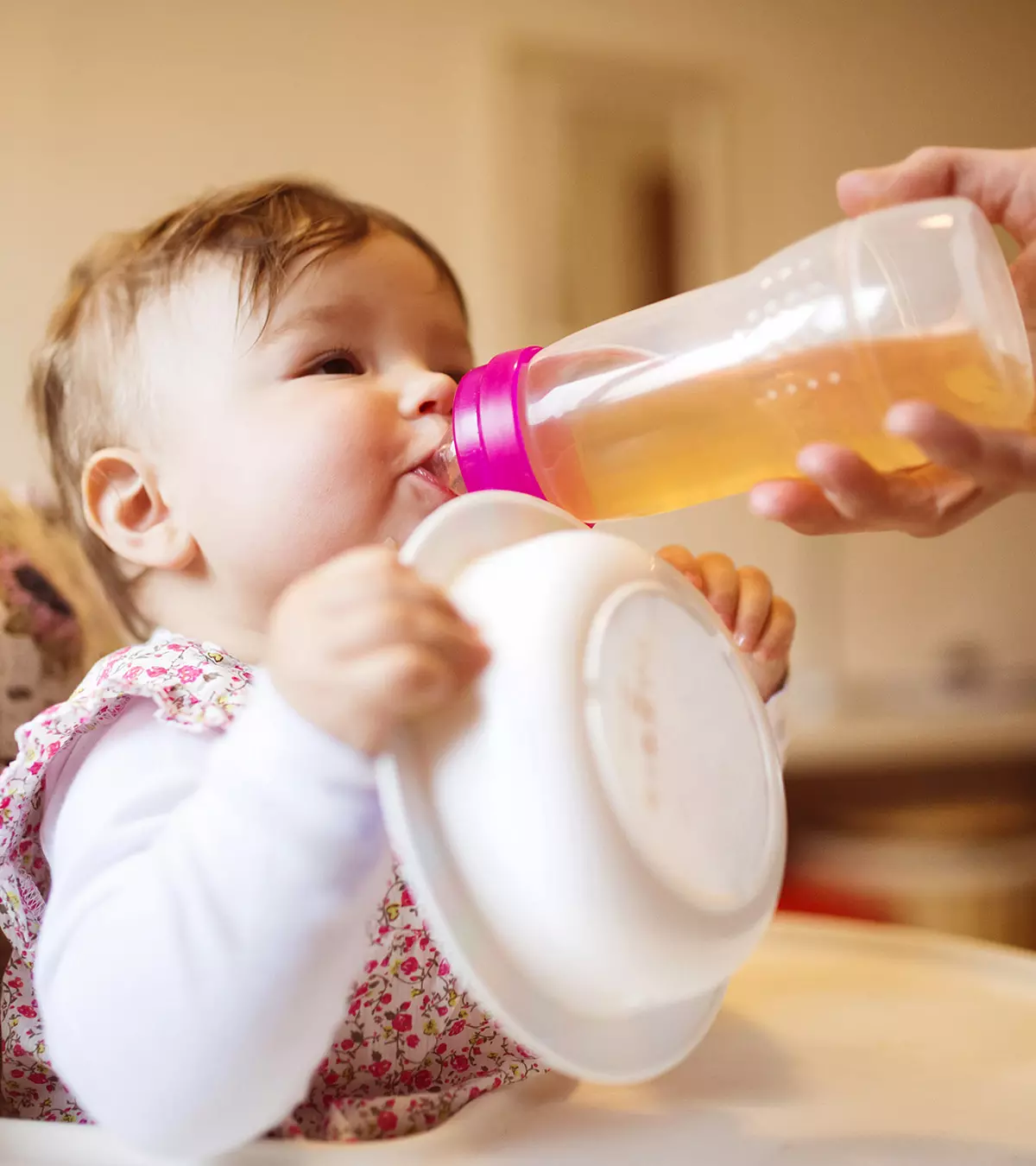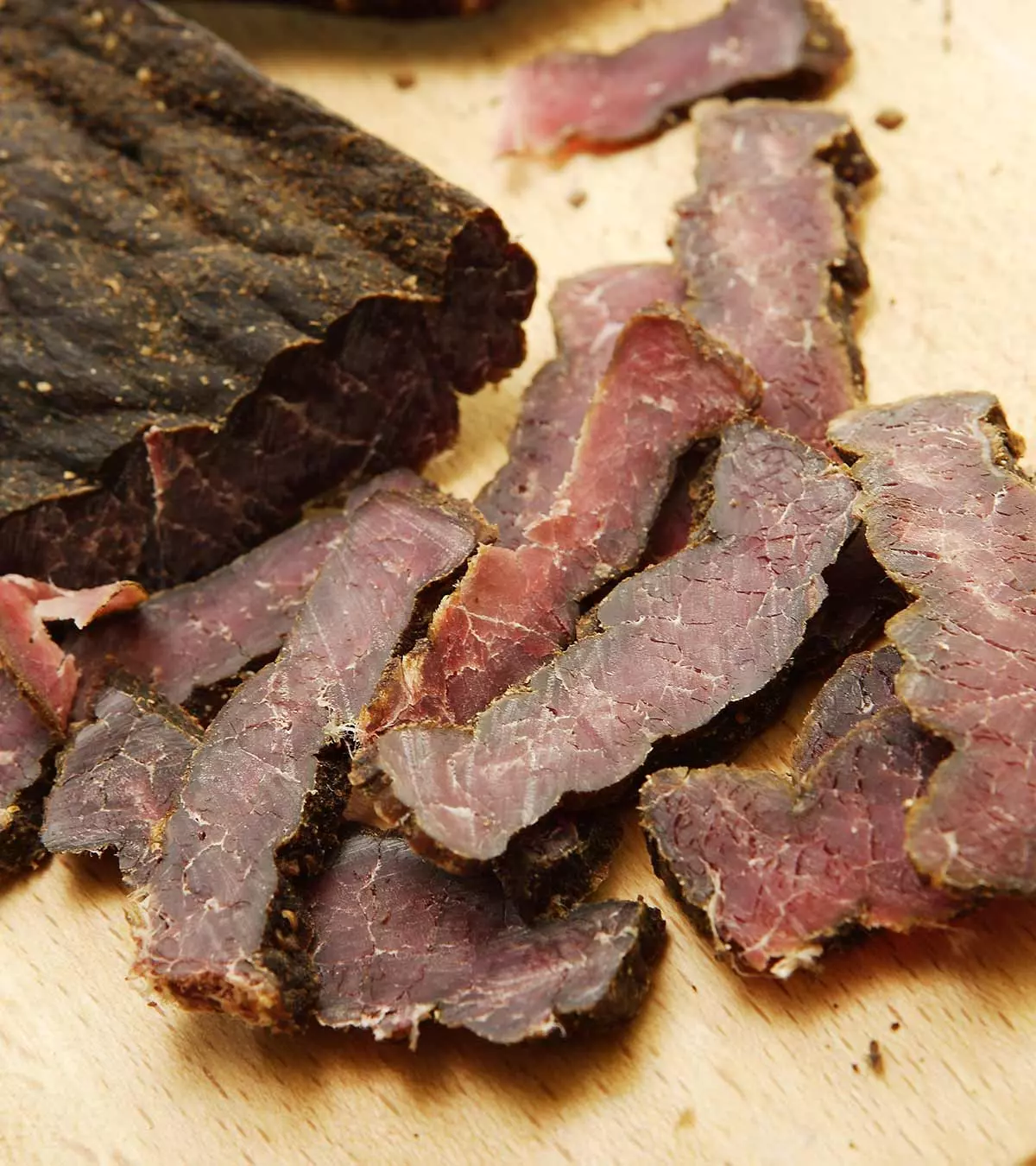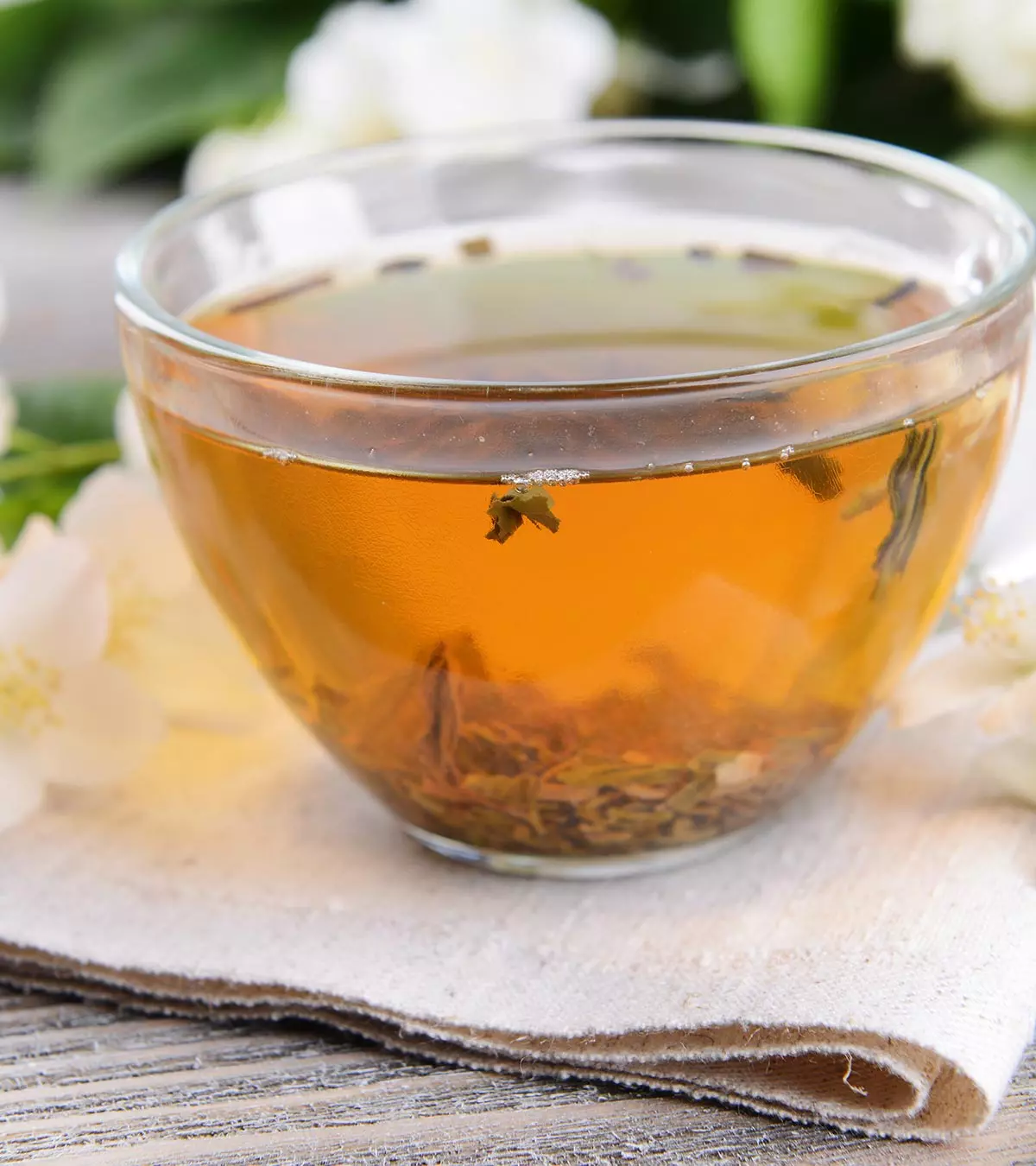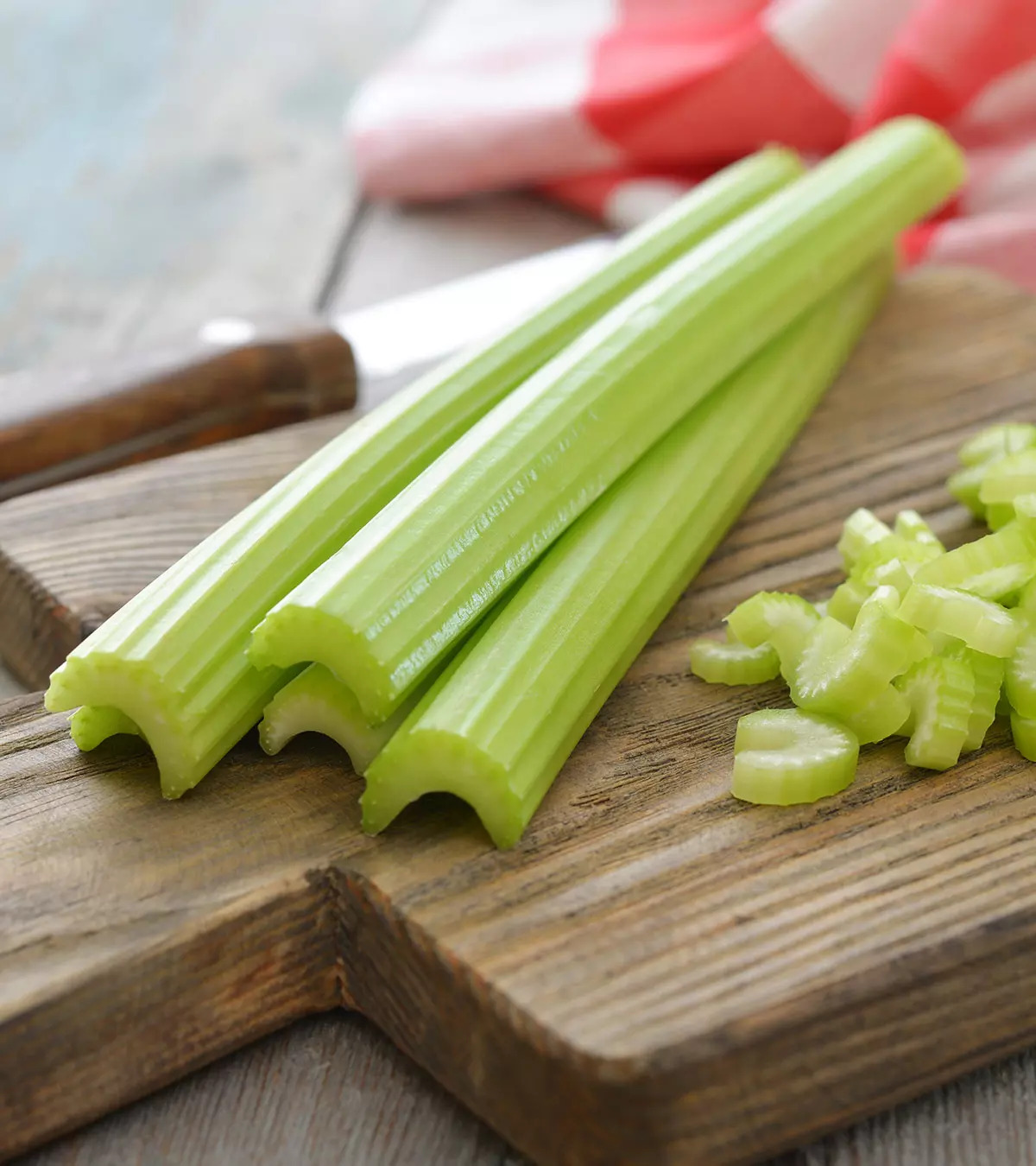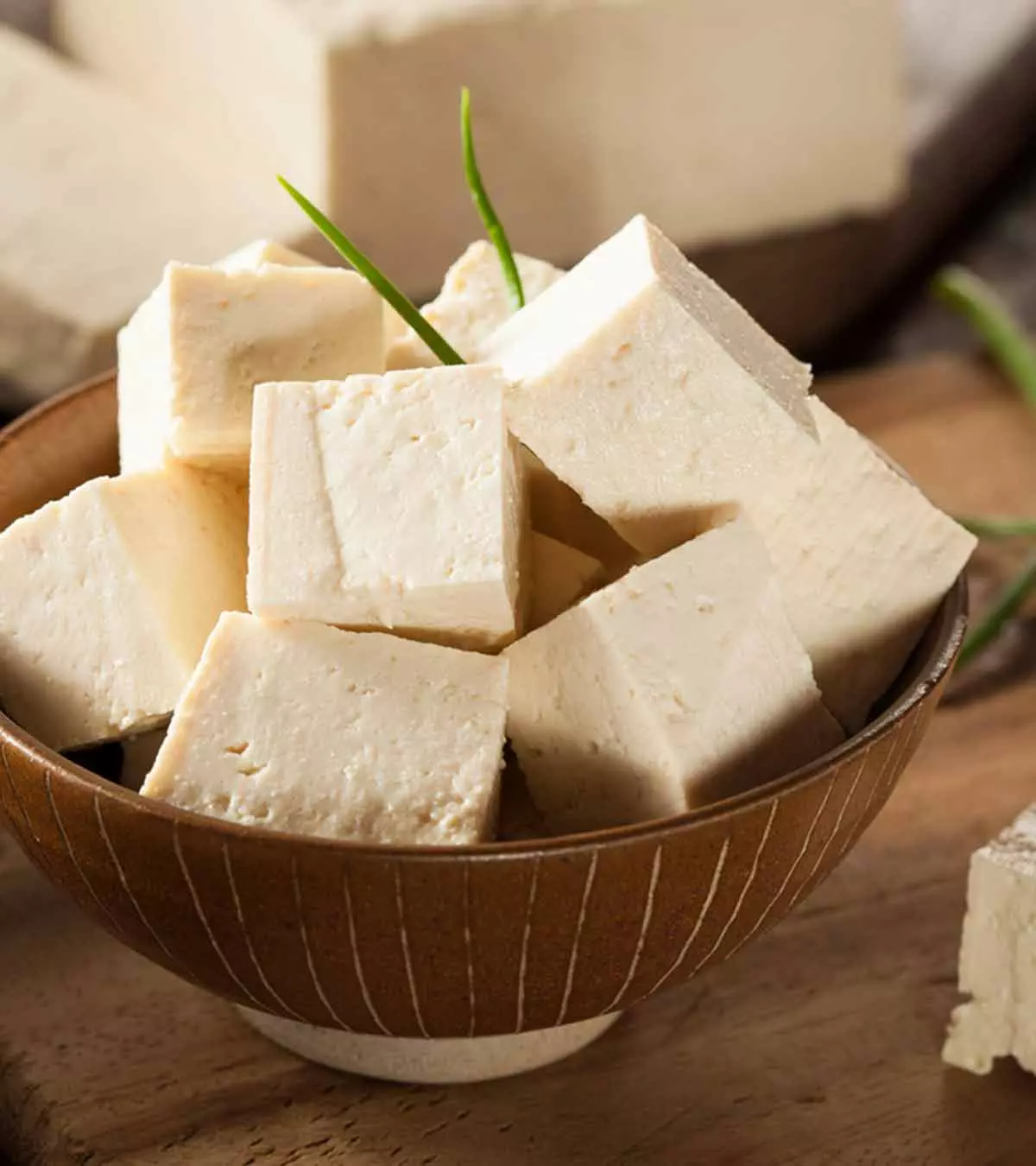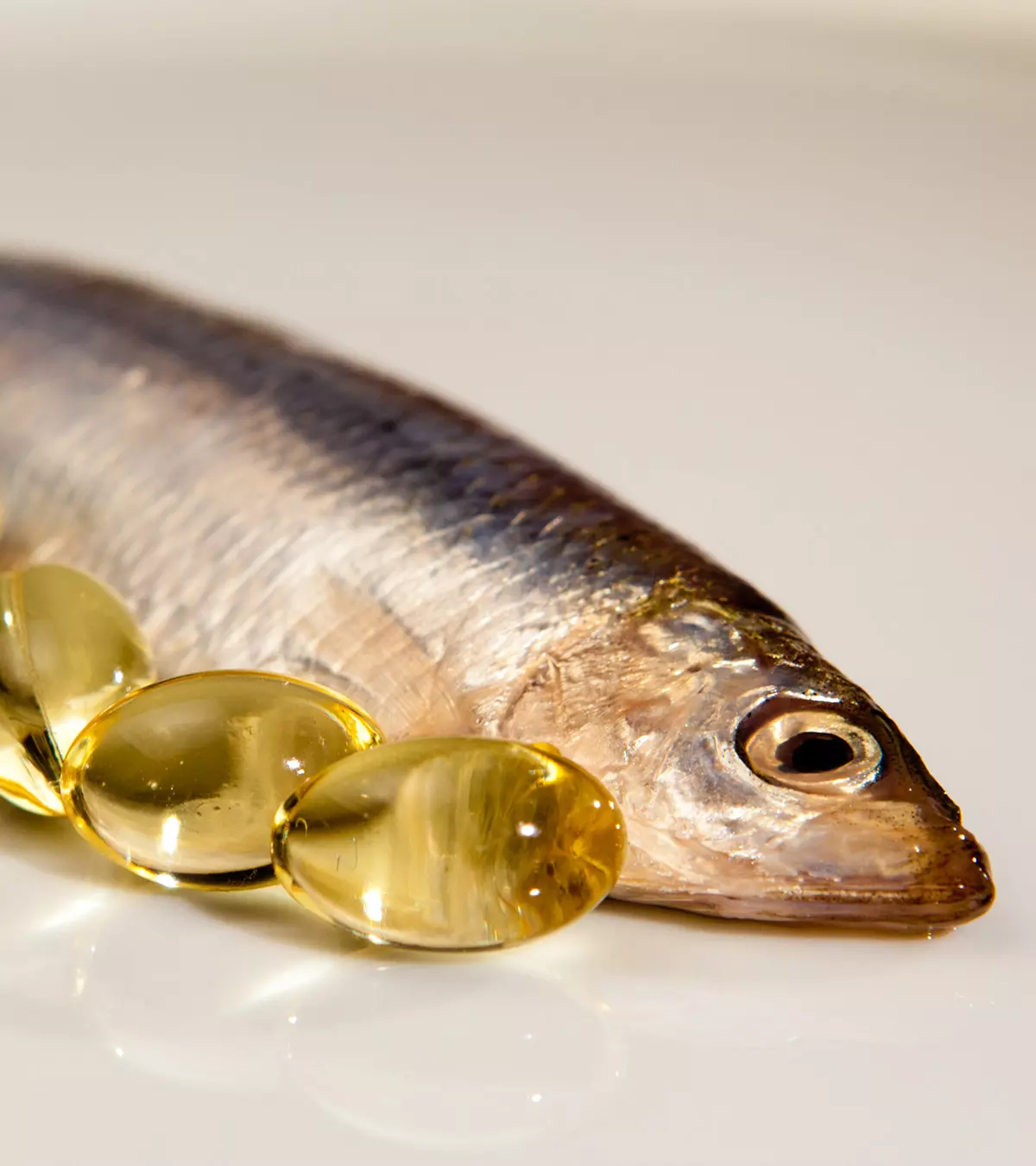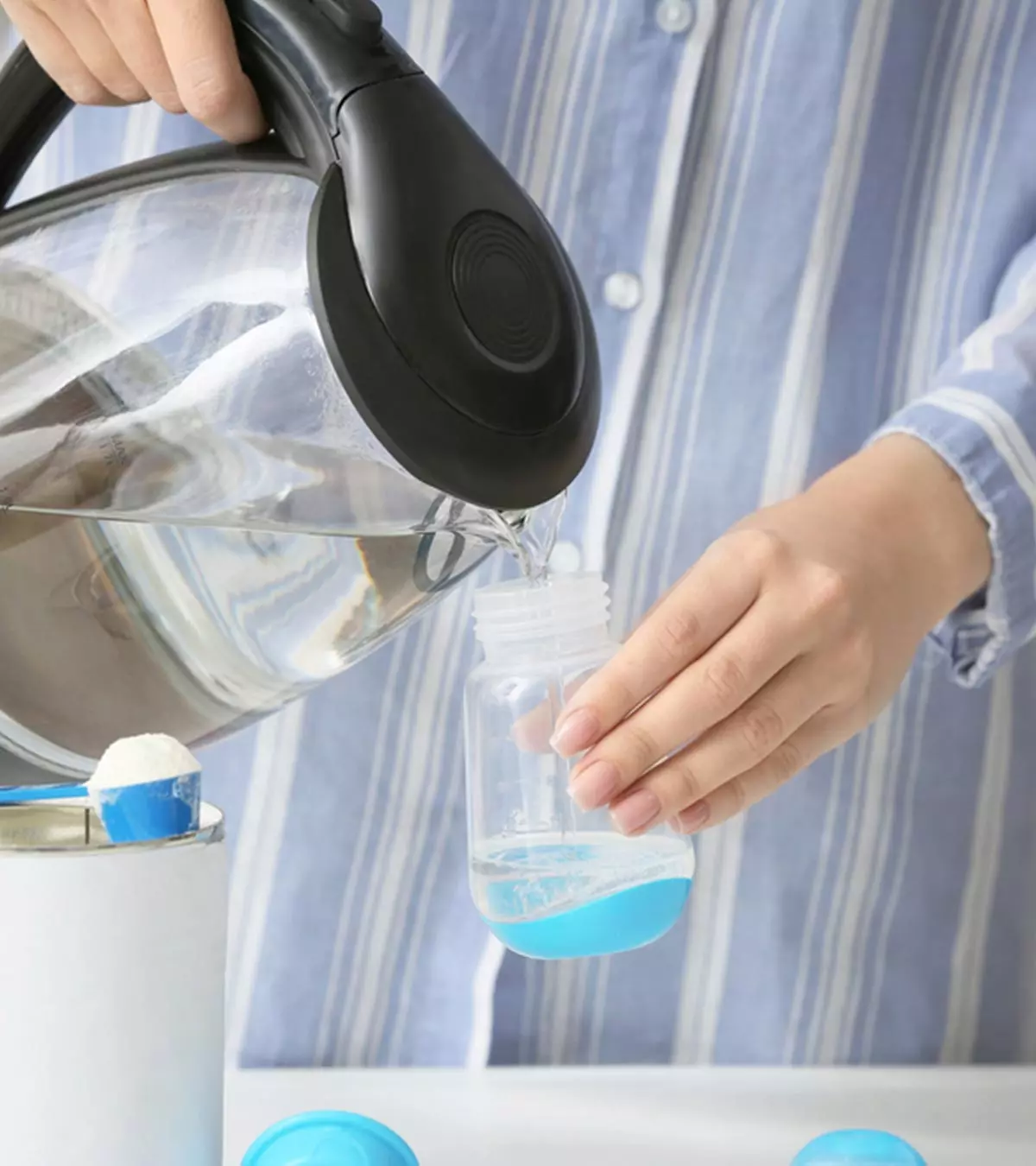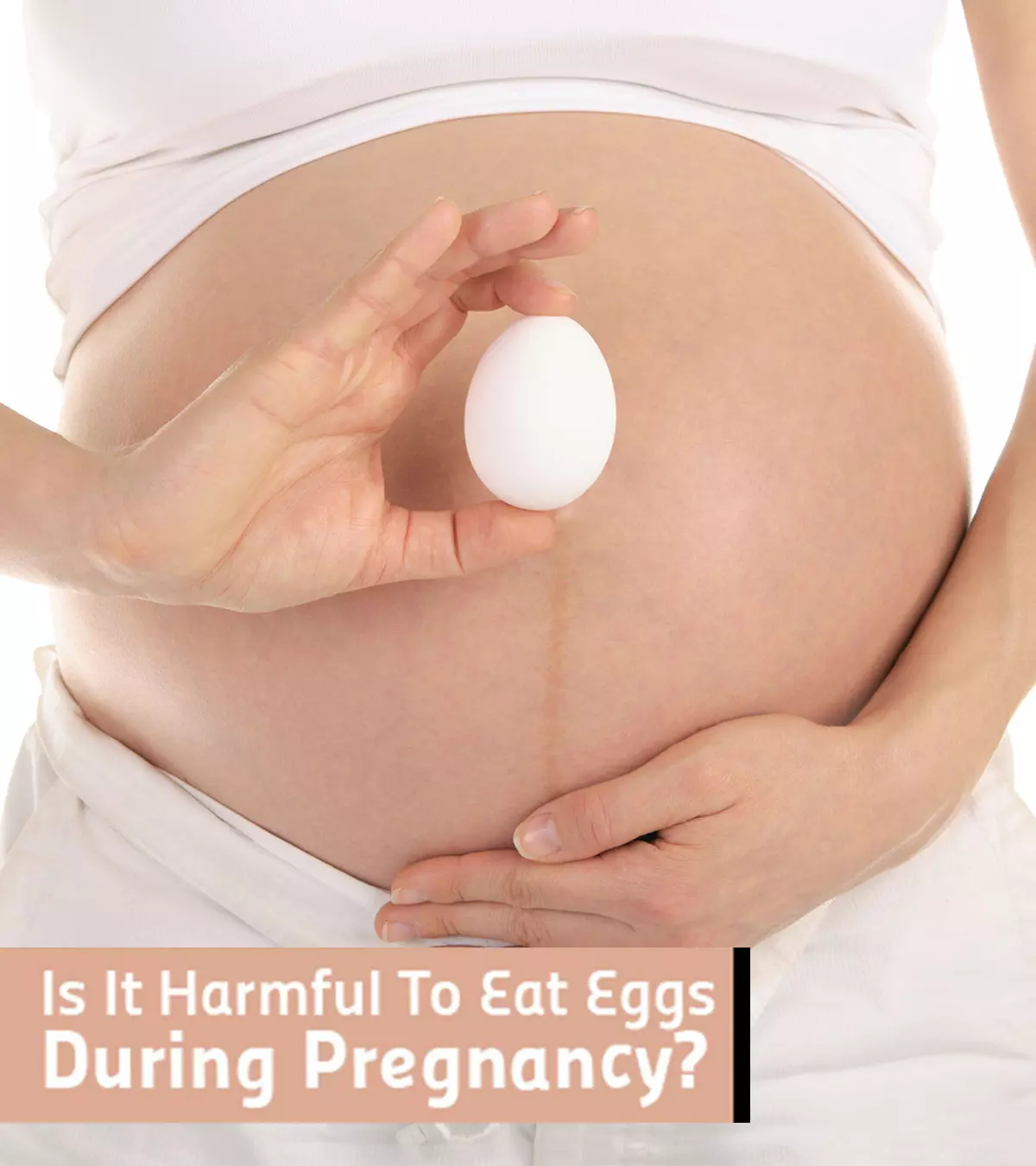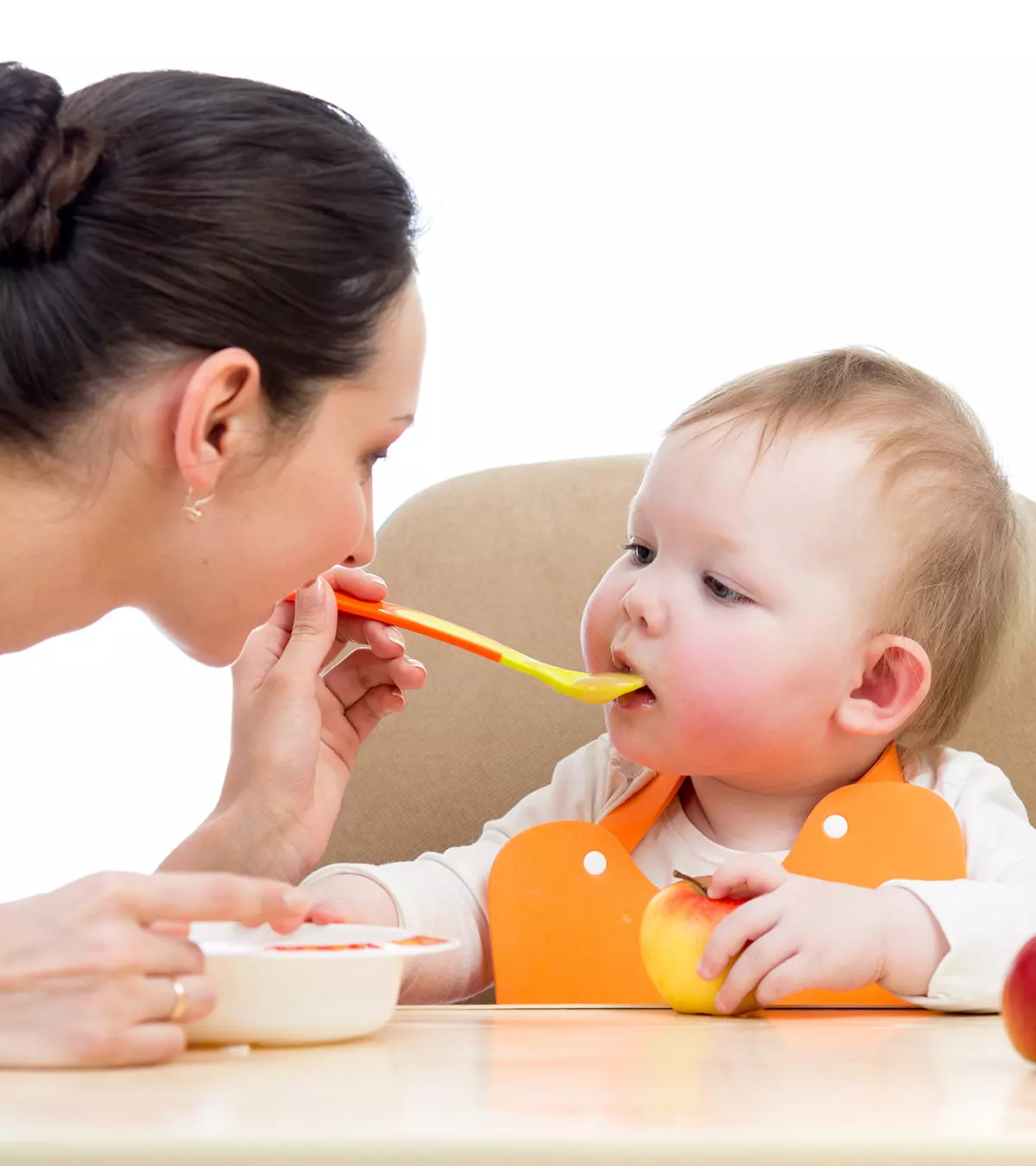
Image: Shutterstock
Apple cider vinegar (ACV) for babies above six months of age on solids can be safe in lesser quantities. You may choose diluted, pasteurized, and filtered ACV to avoid fungi or certain bacteria contamination. It is produced from apple juice that has undergone fermentation and is rich in antioxidantiAny substance that prevents oxidation, thereby protecting cells from damage caused by free radicals. properties and health-promoting effects. ACV is used both internally and externally over the skin. However, you may use diluted ACV to avoid complications such as skin irritation, burn, tooth decay, and increased acid reflux. This vinegar is widely used for health and nutrition purposes. Read on to know the benefits and possible health risks of apple cider vinegar for newborns and how to use them safely.
Key Pointers
- Apple cider vinegar (ACV) is made from fermented apple juice and contains bioactive compounds, enzymes, multivitamins, and acetic acid.
- Diluted, pasteurized, and filtered apple cider vinegar (ACV) can be given moderately to babies older than six months of age.
- Types of ACV include filtered and unfiltered forms, but unfiltered ACV is not recommended for babies as it contains yeast and bacteria.
- ACV has the potential to promote immunity, alleviate acid reflux, relieve pain, treat eczema, fight candidiasis, and cure dandruff.
- ACV, particularly unfiltered, can cause several side effects in babies, such as tooth decay, skin and mouth burn, allergic reactions, and severe acid reflux.
- Parents may introduce ACV (diluted) to babies’ diet by adding it to soups and vegetable purees.
Apple Cider Vinegar And Its Types

ACV is available in two major types – filtered and unfiltered, also referred to as organic ACV (1). The unfiltered ACV contains a mixture of yeast and acetobacter bacteriaiBacteria that oxidize ethanol to acetic acid and are found in rotten fruits, vegetables, and sour liquids or beverages. (2). The yeast and bacteria combination is called “mother,” and unfiltered ACV containers often mention the presence of it. Unfiltered ACV is not pasteurized, thus there is a significant population of live bacteria and yeast, which might not be suitable for all babies, and thus are not antibacterial in nature.
Filtered ACV removes the “mother” and is often pasteurized. This type of ACV has a minimal quantity of live yeast and bacteria, but it might also lack the several nutrients present in unfiltered ACV.
Is Apple Cider Vinegar Safe For Babies?
Apple cider vinegar is generally considered safe for use in babies when you observe the following guidelines. However, consult with a pediatrician before introducing ACV to your baby, especially if they have any medical condition.
1. Choose filtered and pasteurized ACV over the unfiltered one. Organic or unfiltered ACV could contain mold and different strains of yeast (a type of fungus) and bacteria. A baby’s immune system might not be adept at handling several strains of fungi and bacteria.
2. Diluted filtered ACV may be considered for both topical use and dietary consumption. You can also add ACV to baby food recipes to dilute it. An undiluted form of ACV may cause a burning sensation as ACV has a 5% acidity level (3). The general rule of dilution is to dilute two tablespoons (30ml) of ACV with 8oz (237ml) of water (4). You can begin with half or one tablespoon of ACV initially, and then increase it up to two tablespoons.
 Caution
CautionWhen Can You Introduce Apple Cider Vinegar To Babies?
Apple cider vinegar could be introduced to babies once they are at least six months old.
Since ACV is not a standard food item, it is best to consult a pediatrician before introducing it to a baby. Moreover, when giving ACV to babies, always monitor them for any adverse allergic reactions, such as skin rashes, fever, or vomiting.
Health Benefits Of ACV For Babies
In general, ACV contains acetic acid, pectin, multivitamins such as vitamin B1, vitamin B2, vitamin B6, biotin, and vitamin C. It is also believed to have several bioactive compounds such as polyphenolsi that possess antioxidant activities. These nutritional elements are likely to result in the following benefits.
1. Boosts immunity: The use of apple cider vinegar to boost immunity has been recommended due to its antimicrobial properties that are attributed to acetic acid (5). Recent investigations demonstrate the antimicrobial properties of vinegar, mainly in the context of food preparations (6).
2. Alleviates symptoms of acid reflux: Apple cider vinegar is often used as a home remedy for acid reflux in babies and for improved digestion. However, its efficacy is not documented (7). You may use it by including it in foods rather than giving it as a home remedy or a supplement.

3. Relieves pain: Research suggests that apple cider vinegar could help reduce inflammation, especially those caused in the joints. Oral consumption could help provide relief from congenital joint problems (8). However, a few other research studies do not support its pain-relieving effect, especially via the external application (9).
4. Relieves eczema symptoms: Some studies have shown that topical application of apple cider vinegar can possibly aid in treating eczemaiDry, itchy skin rash in response to specific foods and medicines. . Babies with eczema have elevated pH levels that disturb the skin barrier. The acidic nature of ACV can help restore the pH balance of the skin (10). However, you need to consult a dermatologist before trying such home remedies.
 Quick tip
Quick tip5. Enhances mood: Anecdotal evidence states that the use of apple cider vinegar with honey can potentially enhance the mood, including those of fussy babies. This remedy is common in complementary medicine (11). Consult a doctor before using ACV orally.
6. Fights candida infection: Recent research studies and clinical trials have shown the potential antifungal effects of apple cider vinegar (12).
7. Helps treat dandruff: Traditional medicine has documented the effective use of apple cider vinegar in treating dandruff. It can help tackle the excess bacteria and yeast-like fungus that often cause recurring dandruff (13). If you notice dandruff on your baby’s scalp, then consult a pediatrician or dermatologist before using ACV.

8. Helps treat cold and cough: The use of cider vinegar in treating colds and coughs has been well-documented in traditional medicine. However, there are few scientific studies to prove the claim.
It is important to know that most of the benefits associated with ACV are anecdotal. Thus, more research is warranted to make any specific recommendation, especially for babies.
Possible Side-Effects Of Apple Cider Vinegar For Babies
Below are some possible side-effects of ACV, especially if used undiluted (14) (15).
1. Tooth decay: Undiluted cider vinegar can possibly dilute the tooth enamel and damage the teeth.

2. Mouth and throat burn: Oral consumption of undiluted cider vinegar can burn the mouth and throat, thus leading to sores.
3. Skin burn: Undiluted cider vinegar can burn the skin if applied externally. Thus, use ACV for external applications only after diluting it well.
4. Aggravated acid reflux: Excess consumption of diluted apple cider vinegar can cause aggravation of the symptoms. It can also lead to an upset stomach.
5. Possible drug interaction: Apple cider vinegar could have interactions with medicines such as laxatives, diuretics, and medicines for diabetes and heart disease. If your baby is on certain medication, then introduce ACV only after consulting a doctor.
6. Allergy: Apple cider vinegar allergy is rare. However, it is possible, especially when you use an unpasteurized variety. We strongly advise you against using unpasteurized ACV. Oral allergy syndrome or pollen food syndrome is likely to happen if your baby is allergic to apples (16). Cross-reactivityiAllergic reaction triggered by food items containing proteins similar to those found in another food item that one is allergic to. is also a possibility if your baby is allergic to birch pollen, strawberry, peach, plum, cherry, and apricot (17).
Most side effects of apple cider vinegar are associated with the undiluted form or with the unpasteurized version of the vinegar. Observing some good practices can help introduce ACV to a baby safely. If you notice any unusual reactions in your baby after ACV consumption, stop the feed immediately and seek medical care.
Tips To Introduce Apple Cider Vinegar To Babies
Keep the following tips in mind while introducing apple cider vinegar to infants.
- Never give undiluted cider vinegar to babies. Always dilute it before use.
- For therapeutic purposes, not more than 1-2 tablespoons per day is required.
- The best way to give ACV to your baby is to add it to some food items. For example, add a teaspoon of diluted cider vinegar to soups and vegetable purees. It will give some tangy flavor to the recipe as well.
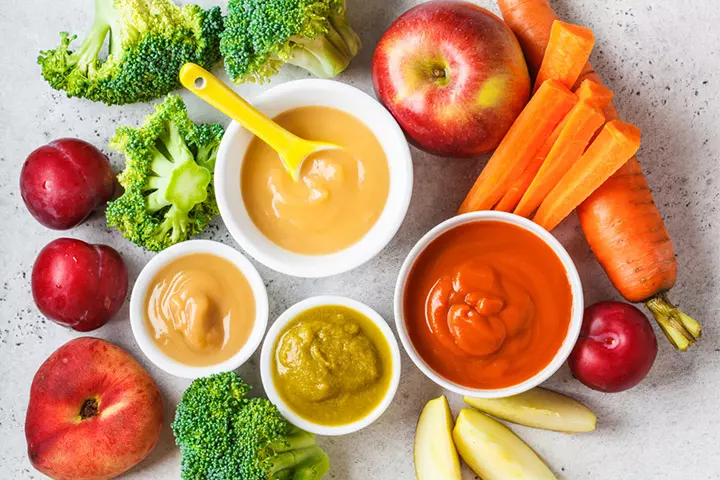
Apple Cider Vinegar Recipes For Babies
1. Homemade Apple Cider Vinegar:
If you are following the no-sugar-rule until toddlerhood, then you may prepare this sugar-free apple cider vinegar for your infant.
You need:
- 3 large apples
- 1L white vinegar
- 5L large glass bottle/ jar (with lid)
How to:
- Core and cut the apples into small pieces.
- Fill the glass bottle/ jar with these pieces and pour vinegar over the top.
- Seal the bottle and place it in the refrigerator for three weeks.
- After three weeks, you may filter this water into a new sterilized jar for daily use.
2. Apple, Pineapple, Kiwi Puree
This unique puree is loaded with antioxidants and essential nutrients that your baby needs, especially during flu season.
You need:
- 2 apples (cored)
- 1tsp grated ginger
- 1tsp lemon juice
- 1tsp apple cider vinegar
- 2 kiwi ripe (peeled)
- 2 slices fresh pineapple (pick sweet portions)
How to:
- Chop the apples into small chunks and steam them for 10 minutes or until soft.
- Chop the kiwi and pineapple slices into small pieces.
- Add the cooked apple, pineapple, and kiwi to a tall container.
- Add grated ginger, lemon juice, and apple cider vinegar to this.
- Blend the ingredients into a smooth puree using an immersion blender.
- Serve some warm and store the rest in the freezer (safe for up to three months).
Filtered and pasteurized apple cider vinegar for babies is considered safe when introduced after six months. It is a health-promoting substance that contains pectiniA type of fiber found in fruits and vegetables involved in lowering blood cholesterol and managing gastrointestinal problems. , multiple vitamins, and antioxidants. ACV may help provide relief from pain and acid reflux and improve immunity. Topical application may benefit eczema and fungal infections. However, its acetic acidiNatural chemical compound used for the production of plastic bottles, photographic films and acidity regulator in foods such as vinegar. content may cause tooth decay and aggravate acidity. You may add ACV to food for a tangy taste, but its use for therapeutic purposes should be in diluted form and only under the guidance of a doctor.
Frequently Asked Questions
1. What happens if a toddler drinks significant amounts of vinegar?
If a toddler drinks significant amounts of vinegar, it may cause nausea and vomiting. If you find that your child has ingested excess vinegar, give them some water, and call the doctor (18).
2. Is apple cider vinegar good for fatty liver in babies?
Apple cider vinegar may work as a home remedy to alleviate the symptoms of fatty liver disease in adults (19); however, there is no such evidence in babies.
3. How does apple cider vinegar compare to other natural remedies for babies?
Apple cider vinegar is a well-liked natural treatment for dandruff and eczema, but more research is required to support its effectiveness. On the other hand, coconut oil and oatmeal baths are recommended for relieving dandruff and eczema, respectively, due to their nutritional composition and soothing properties (20) (21). Moreover, when dealing with colic in babies, probiotics have demonstrated a noteworthy decrease in crying time. This makes probiotics more effective in treating colic than apple cider vinegar (22).
Infographic: Tips To Introduce Apple Cider Vinegar (ACV) To Babies
Apple cider vinegar (ACV) is a popular natural treatment for various health conditions and has also been used to treat a baby’s minor ailments, such as diaper rash and colic. So, scroll through the infographic below to explore the proper ways to give ACV to babies.
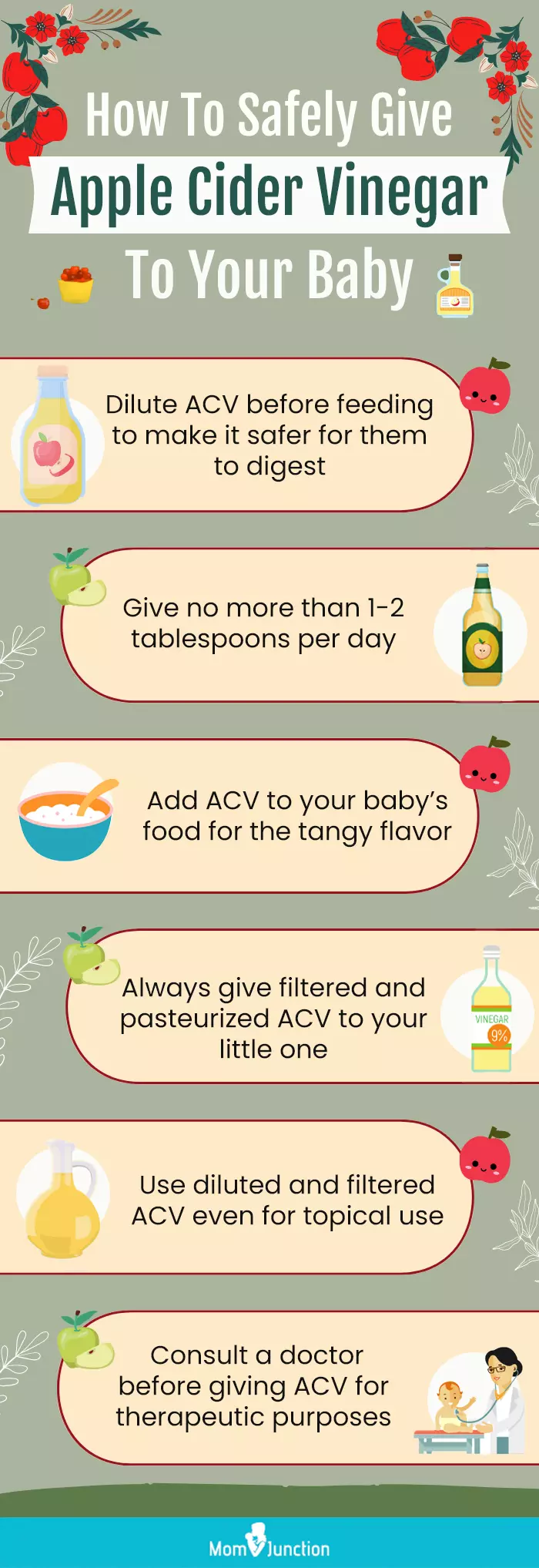
Illustration: Momjunction Design Team
Illustration: Is Apple Cider Vinegar For Babies Safe?
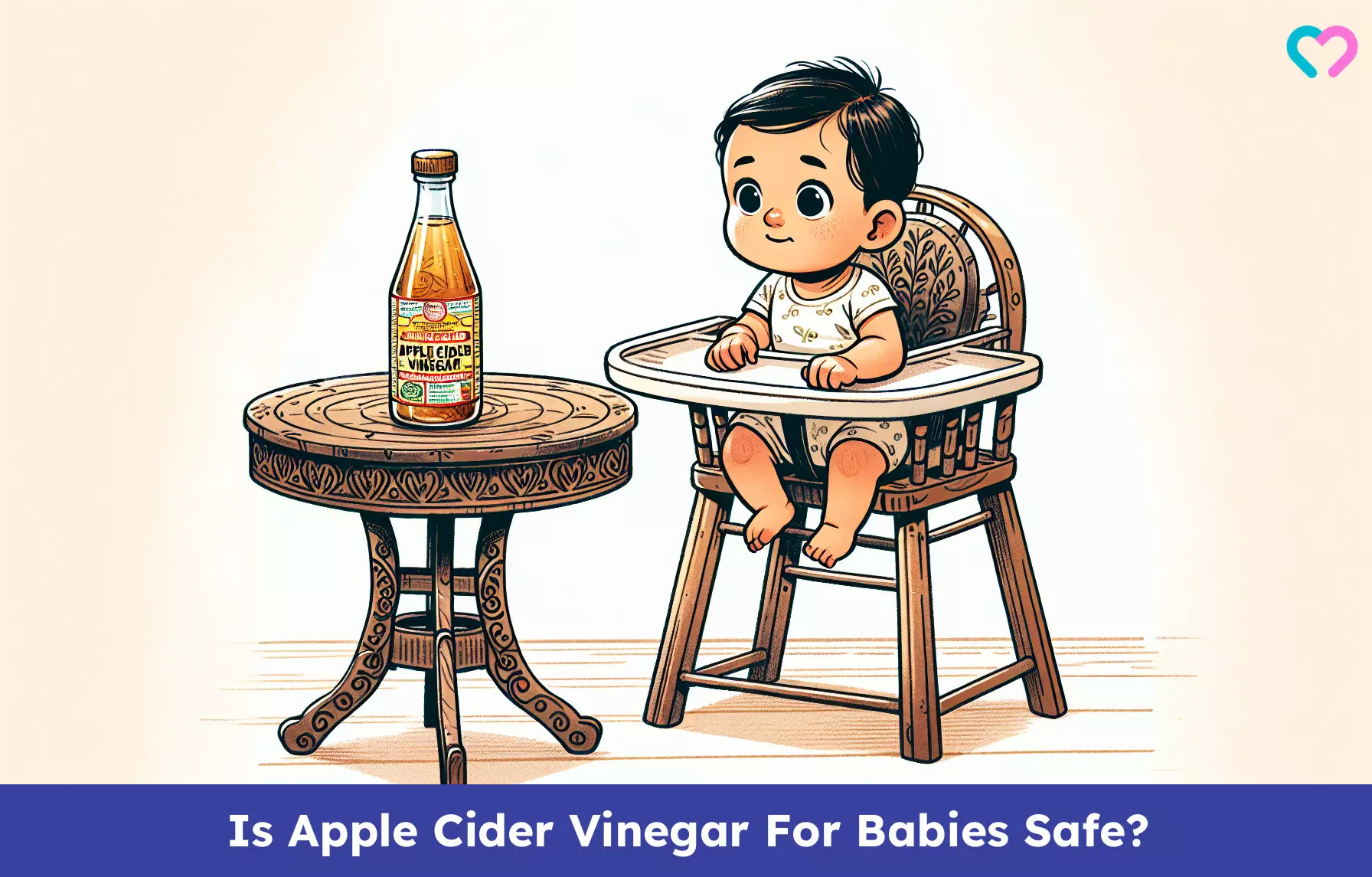
Image: Dalle E/MomJunction Design Team
Discover the amazing nutritional benefits of apple cider vinegar for kids! Learn how it can help improve digestion, boost immunity, and more!
References
1. Aleksandra Stornik et al., Comparison of Cultivable Acetic Acid Bacterial Microbiota in Organic and Conventional Apple Cider Vinegar; National Center For Biotechnology Information
2. Debunking the health benefits of apple cider vinegar; Uchicago Medicine
3. Carol S. Johnston and Cindy A. Gaas; Vinegar: Medicinal Uses and Antiglycemic Effect; National Center For Biotechnology Information
4. What Does Apple Cider Vinegar Not Do?; Pacific College of Health and Science
5. Thomas Bjarnsholt et al., Antibiofilm Properties of Acetic Acid; National Center For Biotechnology Information
6. Darshna Yagnik et al., Antimicrobial activity of apple cider vinegar against Escherichia coli, Staphylococcus aureus and Candida albicans; downregulating cytokine and microbial protein expression; National Center For Biotechnology Information
7. Apple cider vinegar… for heartburn?; Harvard Medical School
8. Singh Akanksha and Sunita Mishra; Study About The Nutritional And Medicinal Properties of Apple Cider Vinegar Article Info Abstract; Researchgate
9. M.S.Christine M.Ross; The effect of apple cider vinegar on adjuvant arthritic rats; Science Direct
10. Get the Facts: Apple Cider Vinegar; National Eczema Association
11. Naseem Akhtar Qureshi and Abdullah Mohammed Al-Bedah, Mood disorders and complementary and alternative medicine: a literature review; National Center For Biotechnology Information
12. Mota AC et al., Antifungal Activity of Apple Cider Vinegar on Candida Species Involved in Denture Stomatitis.; National Center For Biotechnology Information
13. Kalaivani Natarajan and Lakshmi T, Traditional vs Conventional Methods for the Management of Dandruff; International Journal of Science and Research
14. Does apple cider vinegar have any proven health benefits?; Harvard Health Publishing
15. Beyond the Hype: Apple Cider Vinegar as an Alternative Therapy; The Whole You; University of Washington
16. Oral Allergy And Apple Cider; American Academy of Allergy, Asthma & Immunology
17. Allergy information for: Apple (Malus domestica); The University of Manchester
18. Vinegar; Missouri Poison Center
19. Mustafa Nazıroğlu et al.; Apple Cider Vinegar Modulates Serum Lipid Profile, Erythrocyte, Kidney, and Liver Membrane Oxidative Stress in Ovariectomized Mice Fed High Cholesterol; The Journal of Membrane Biology
20. Original Living Coconut, LLC – 561493 – 10/10/2018; FDA
21. Things to Know About Atopic Dermatitis (Eczema); Texas Education Agency
22. Thomas Koonce et al; Colicky baby? Here’s a surprising remedy; National Center For Biotechnology Information
23. Botulism and Honey. What’s the Connection?; National Capital Poison Center
24. Soothing Your Child’s Eczema; Sutter Health
Community Experiences
Join the conversation and become a part of our nurturing community! Share your stories, experiences, and insights to connect with fellow parents.
Read full bio of Jyoti Benjamin
Read full bio of Swati Patwal
Read full bio of Rohit Garoo
Read full bio of Ghazia Shah








